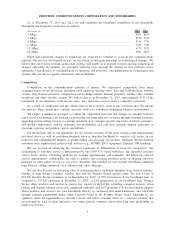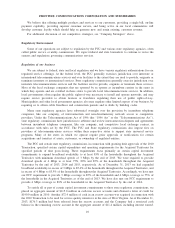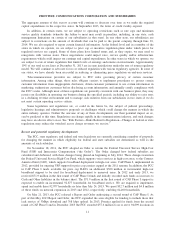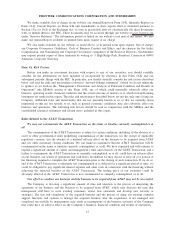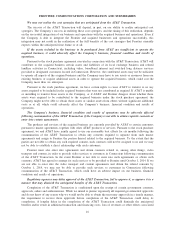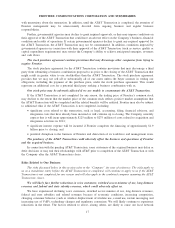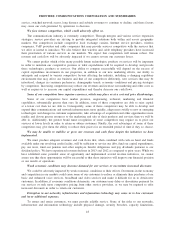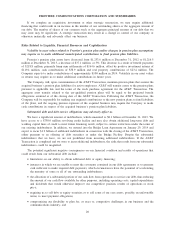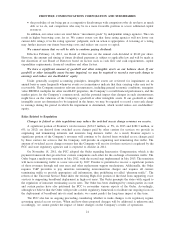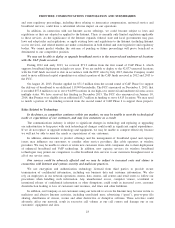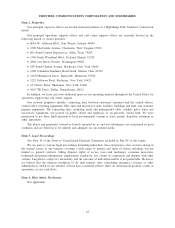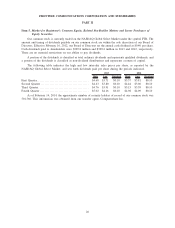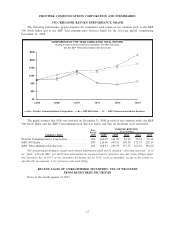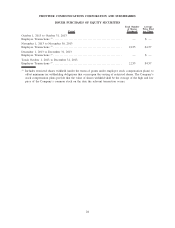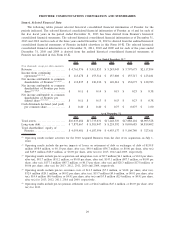Frontier Communications 2013 Annual Report Download - page 20
Download and view the complete annual report
Please find page 20 of the 2013 Frontier Communications annual report below. You can navigate through the pages in the report by either clicking on the pages listed below, or by using the keyword search tool below to find specific information within the annual report.power surges or outages, software defects and other disruptions beyond our control, such as natural disasters
and acts of terrorism. From time to time in the ordinary course of business, we experience short disruptions in
our service due to factors such as cable damage, theft of our equipment, inclement weather and service failures
of our third-party service providers. We could experience more significant disruptions in the future. We could
also face disruptions due to capacity limitations if changes in our customers’ usage patterns for our broadband
services result in a significant increase in capacity utilization, such as through increased usage of video or peer-
to-peer file sharing applications. Disruptions may cause interruptions in service or reduced capacity for
customers, either of which could cause us to lose customers and/or incur additional expenses, and thereby
adversely affect our business, revenues and cash flows.
Our business is sensitive to the creditworthiness of our wholesale customers.
We have substantial business relationships with other communications carriers for whom we provide
service. While bankruptcies of these carriers have not had a material adverse effect on our business in recent
years, future bankruptcies in the industry could result in the loss of significant customers for us, as well as
cause more price competition and an increased allowance for doubtful accounts receivable. Such bankruptcies
may be more likely in the future if economic conditions stagnate. As a result, our revenues and results of
operations could be materially and adversely affected.
A significant portion of our workforce is represented by labor unions.
As of December 31, 2013, we had approximately 13,650 employees. Approximately 8,400 of these
employees, or 62% of the total workforce, were represented by unions and were therefore subject to collective
bargaining agreements. As of December 31, 2013, we had approximately 2,600 employees covered by
collective bargaining agreements that expired in 2013, but have been extended and are still effective in 2014.
Of the union-represented employees as of December 31, 2013, approximately 1,200, or 14%, of the unionized
workforce are covered by collective agreements that expire in 2014 and approximately 1,350, or 16%, of the
unionized workforce are covered by collective bargaining agreements that expire in 2015.
We cannot predict the outcome of negotiations of the collective bargaining agreements covering our
employees. If we are unable to reach new agreements or renew existing agreements, employees subject to
collective bargaining agreements may engage in strikes, work slowdowns or other labor actions, which could
materially disrupt our ability to provide services. New labor agreements or the renewal of existing agreements
may impose significant new costs on us, which could adversely affect our financial condition and results of
operations in the future.
If we are unable to hire or retain key personnel, we may be unable to operate our business successfully.
Our success will depend in part upon the continued services of our management. We cannot guarantee that
our key personnel will not leave or compete with us. The loss, incapacity or unavailability for any reason of
key members of our management team could have a material impact on our business. In addition, our financial
results and our ability to compete will suffer should we become unable to attract, integrate or retain other
qualified personnel in the future.
We may complete a future significant strategic transaction that may not achieve intended results or
could increase the number of our outstanding shares or amount of outstanding debt or result in a change of
control.
We continuously evaluate and may in the future enter into additional strategic transactions, such as the
AT&T Transaction. Any such transaction could happen at any time, could be material to our business and could
take any number of forms, including, for example, an acquisition, merger or a sale of all or substantially all of
our assets.
Evaluating potential transactions and integrating completed ones may divert the attention of our
management from ordinary operating matters. The success of these potential transactions will depend, in part,
on our ability to realize the anticipated growth opportunities and cost synergies through the successful
integration of the businesses we acquire with our existing business. Even if we are successful in integrating
acquired businesses, we cannot assure you that these integrations will result in the realization of the full benefit
of any anticipated growth opportunities or cost synergies or that these benefits will be realized within the
expected time frames. In addition, acquired businesses may have unanticipated liabilities or contingencies.
19
FRONTIER COMMUNICATIONS CORPORATION AND SUBSIDIARIES


